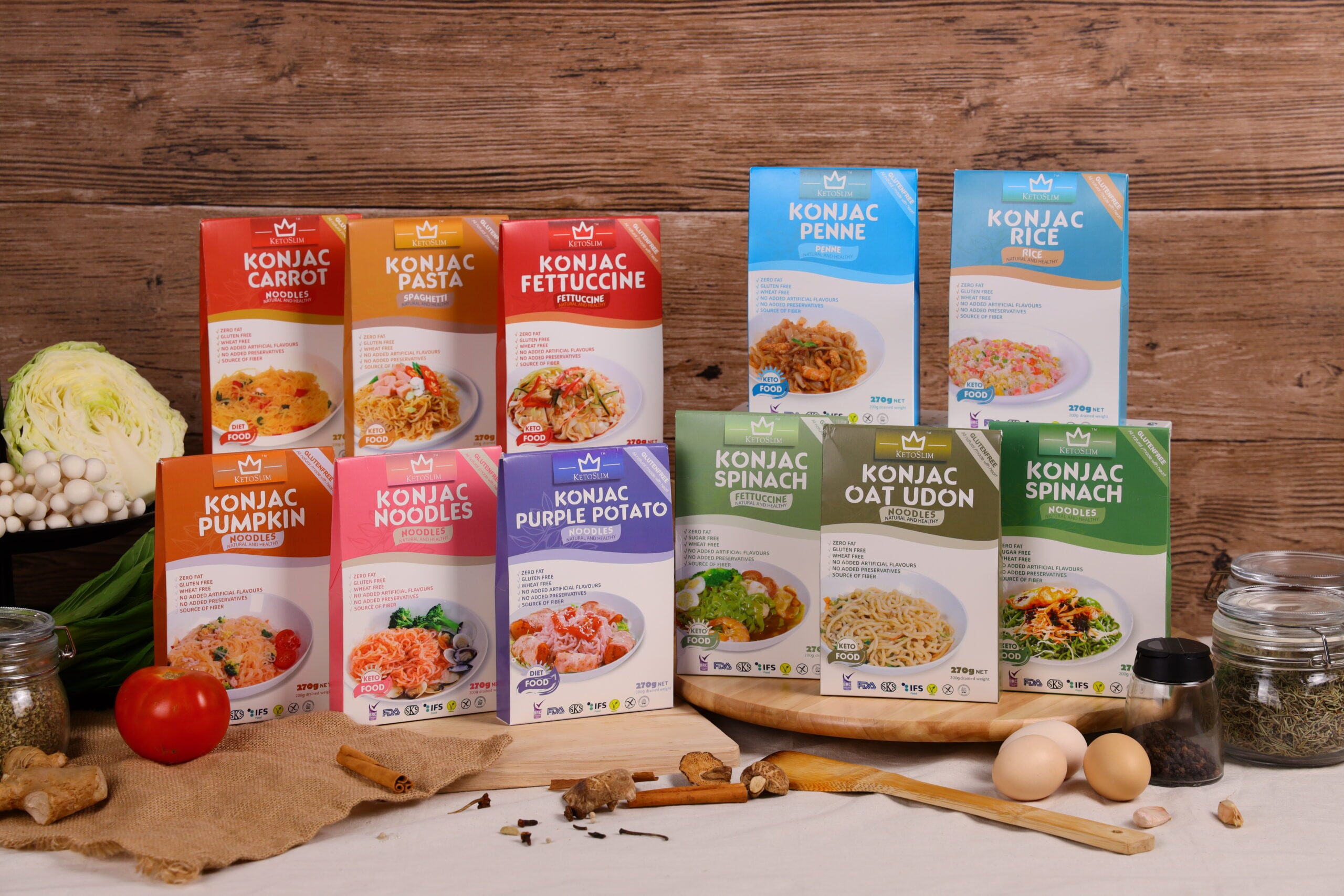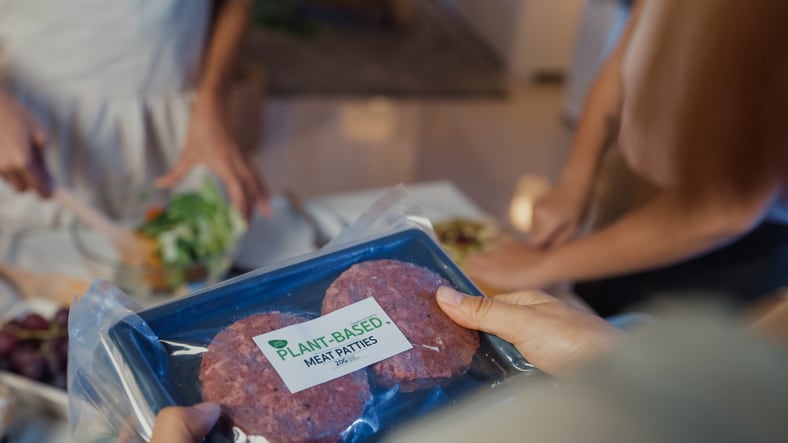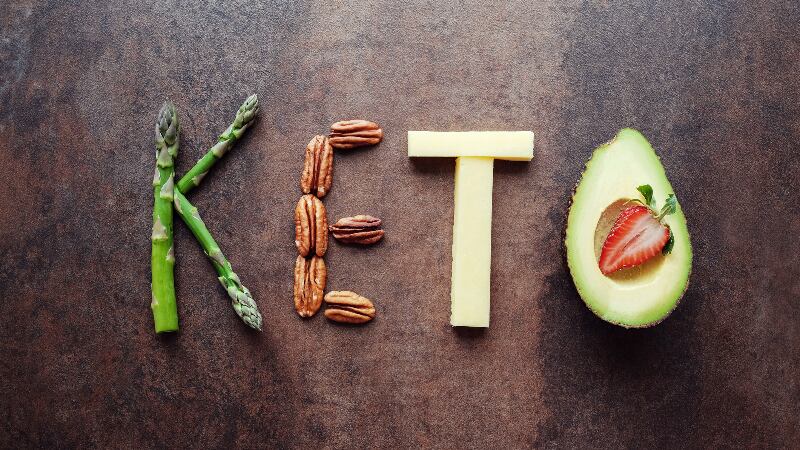The firm aims to make eating rice and noodles ‘guilt-free’ with its konjac-based innovations, which are high in fibre but contain very few calories. Konjac helps with weight loss and maintenance, as well as blood glucose regulation. It is also known to reduce high cholesterol and is rich in fibre.
However, focusing on the health benefits is only one part of the equation.
“We want to offer choice and variety, especially for those with health conditions,” said Vicky Liu, senior sales manager at Ketoslim Mo.
“Our customers are constantly asking if we could make everything zero-carb or zero-fat, but that is not possible. Something has got to give,” said Liu as she explained that customers still desire the experience of eating their traditional rice staple yet are concerned about carbohydrates.
However, she reasoned that the amount of carbohydrates and fat are low enough that it still beats consuming actual rice, which gives a much higher calorie count – for every 100 g of cooked white rice, there are about 130 g of carbohydrates. In contrast, every 100 g of Ketoslim Mo’s konjac rice contains around 77 g of carbohydrates.
She revealed that Ketoslim Mo does carry a zero-carbohydrate range of rice, which is packaged in water to prevent it from drying out. The texture is more jelly-like and less like the mouthfeel of jasmine, basmati or pearl rice.
“The presence of fat and carbohydrates is inevitable for some of our products because we need to add flour. This will enable us to emulate the texture of traditional rice and noodles better,” said Liu.
Apart from texture, Ketoslim Mo focusses on taste and convenience to elevate eating experience.
Appealing to the carb-conscious in Asia
The instant series, such as the Self-Heating Instant Lower Carb Rice, comes in convenient packs of 200 g. They can be eaten as is or with condiments. For those who prefer a warm meal, it can be heated in the microwave oven for two minutes.
The instant noodles come in tomato, spicy pea, vegan tomato, and sauerkraut flavours, with the last one inspired by the latest craze surrounding Sichuan-flavoured food.
Liu also mentioned Ketoslim Mo’s new product series, the Popping Boba Bubble Instant Milk Tea Kits, which are targeted at online retailers, supermarkets and cafes. This range contains all the ingredients needed to make milk tea but the boba pearls are made from konjac, a healthier version of the starchy ones that bubble tea lovers are familiar with. There are flavours like lychee, mango, orange, pomegranate, and passionfruit.
Another important feature is the convenience it offers. The preparation methods are quick and straightforward.
“It’s healthy, quick and simple. Very good for office workers who want to bring their own meals to work. You don’t need to wait for 20 to 25 minutes, the time taken to cook white rice,” said Liu as she showed FoodNavigator-Asia the Ketoslim Mo range at FHA Food & Beverage 2024, held at the Singapore Expo from 23 to 26 April.
“By itself, konjac does not contain any sugar or fat because it’s 97% water and 3% fibre. The fibre gives a sense of fullness and discourages overeating,” said Liu of the root vegetable that comes from the konjac plant, which has been used in Asia for thousands of years, in particular China and Southeast Asia.
This is significant for Asia, where type 2 diabetes is a health concern. Offering a healthy carbohydrate alternative is crucial so that patients are less likely to suffer from calorie overload.
Ketoslim Mo’s products are also suitable for health enthusiasts who watch their carbohydrate intake, such as those following the keto diet or weight-conscious individuals.
Getting around the challenges
Developing this range of products does not come without challenges, one of which is coming up with the right flavours.
“To break into the halal markets, ingredient sourcing poses a problem because we can’t formulate as many flavours as we would like to, especially for those unique to a particular region. We can’t, for example, develop an authentic tomyum flavour because our suppliers are either not halal or they don’t possess the certificates required for export,” said Liu.
Liu said its range is already widely distributed in Europe and parts of America because there are no issues with halal certifications. Morrisons, Tesco, Sainsbury, and Waitrose are some of the supermarket chains in the UK that carry its products. Other global retail channels include Lidl in Germany and the US, Migros in Switzerland and Intermarche in France.
Within Asia, Ketoslim Mo’s footprint is mostly in Malaysia, where retailers like Lotus, Aeon, and Mr DIY carry their products. Customers in Singapore can also make purchases via online platforms such as Lazada and Shopee. Ketoslim Mo plans to distribute in Singapore’s supermarkets soon, and the price will be around $2 (US $1.50) for a pack of konjac rice or noodles.
Ketoslim Mo was formed in 2018, but it started out as a konjac manufacturer for other brands 12 years ago. Its short-term goal is to expand its presence in Asia.
Healthier Product Innovation will be taking centre stage at our Growth Asia Summit 2024 this coming July, which will feature insights from a wide range of industry leaders and experts. Don't miss out – register here today!





